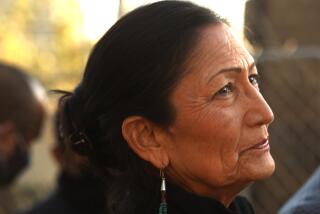Up for Grabs : Teen’s Indian Heritage May Alter Adoption of Her Baby
- Share via
Joan Argleben spends her mornings attending summer classes to complete her junior year of high school. She does as much studying as possible while in class, because when she goes home she must care for her 5-week-old baby girl.
The high school student realized early that it would be difficult to both care for a child and complete her education. So when she learned of her pregnancy last September, she and her family, who live in Cypress, immediately began preparing for the baby’s adoption.
A family friend arranged with a couple in New York to adopt the baby, and plans proceeded. The couple’s lawyer alerted the Arglebens, Joan’s adopted family, that because the 18-year-old is an Aleut Indian, a 1978 federal law gives her Alaskan Indian tribe the right to raise the child if she decides not to.
The attorney, Aaron Britvan, sent a letter about the adoption to the Alaskan tribe and plans for the adoption proceeded. In June, a day before the baby was born in New York, Britvan received a letter saying the tribe had found an Indian family to raise the child.
“It happened so all of a sudden,” said Judith Argleben, Joan’s mother. “I got a phone call the day after the baby was born in New York to buy a ticket for my daughter because she and the baby were coming home.
“We thought when we adopted Joan that we had severed the ties she had with the tribe. Now we found out that they have say in her life 15 years later.”
Joan doesn’t understand how the law can apply to her. She was 3 when she and her sister were taken from their tribe. Later, they were adopted by the Arglebens, who aren’t Indian.
“I was not raised in an Indian culture, and that was no one’s concern,” Joan said. “Now, how my baby is raised is.
“I feel like I know what is right for me and my child and no else should have the right to interfere.”
The federal law exercised by the Aleut tribe is aimed at preventing the breakup of Indian families and to ensure the right of American Indian children to develop an Indian identity.
“Ultimately, it’s a constitutional imbalance,” Britvan said. “We understand everything the Indians have and are going through, and we’re not trying to take away from that. All we’re saying is, ‘What about the mother’s constitutional rights of what she wants for her child?’ ”
But Jack Trope, staff attorney for the Assn. of American Indian Affairs, a nonprofit advocacy group based in New York, said Joan relinquished her rights when she decided to give her child up for adoption.
“The constant criticism of this act is that it doesn’t recognize the mother’s wishes. But when she decides to give the child up, she does not have a say-so in his life,” Trope said. “No court decides what’s the best for a child solely on a mother’s wishes, Indian or not. The tribe isn’t as concerned with what the mother wants as it is about what is best for the child.”
Trope added that research strongly indicates Indian children don’t fare well in non-Indian homes.
“In the 1970s, one out of four Indian children were placed outside of an Indian environment,” he said. “And what eventually happens is that a large amount of these kids get about 18 or older and realize they’re very unhappy and confused.
“Then they try to get to know about themselves and their Indian heritage, but it’s hard because most don’t have contacts with their own culture.”
Despite what may be a long and expensive court battle, Joan still wants the New York family to raise the daughter she has unofficially named Rebecca. She is trying to find a lawyer to challenge the federal law.
“Even though it will be hard giving her up after this time, I know it is best,” Joan said. “I remind myself that I cannot give her the things she needs and should have.”
Joan, her mother said, “shouldn’t have to go through this. She knows what’s best for the child. And she knows that she needs time to finish school and begin her life. You can’t do that and take care of a child.”
More to Read
Sign up for Essential California
The most important California stories and recommendations in your inbox every morning.
You may occasionally receive promotional content from the Los Angeles Times.













